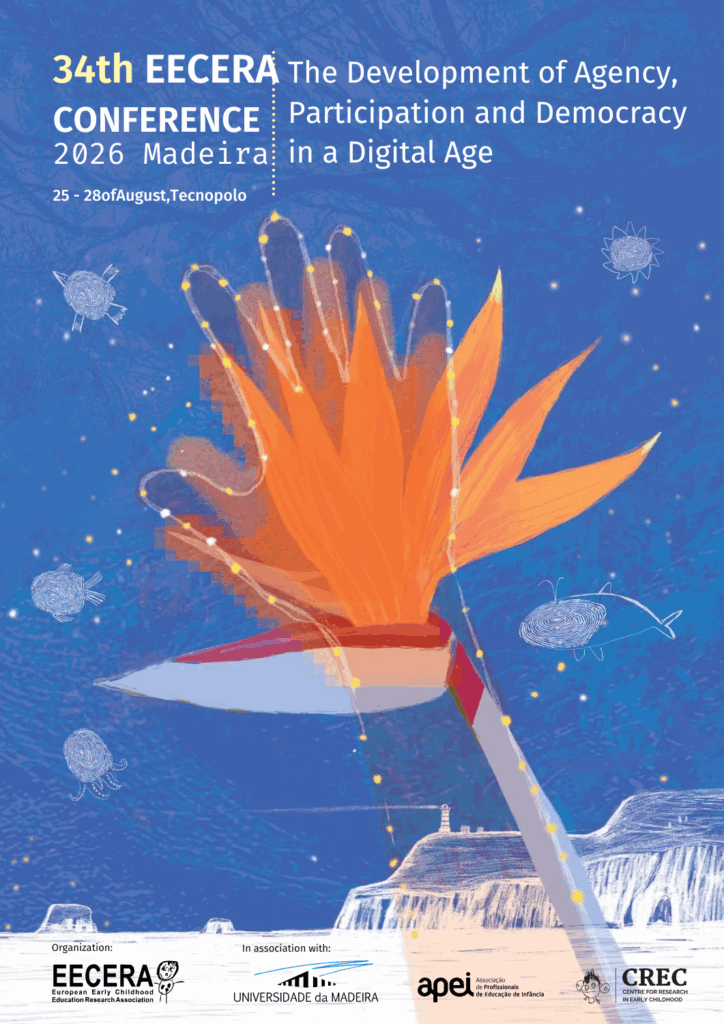EECERA 2026
25 – 28 August 2026 | Funchal, Madeira
Quick links
Accommodation

THE DEVELOPMENT OF AGENCY, PARTICIPATION AND DEMOCRACY IN THE DIGITAL AGE
In the rapidly evolving landscape of the 21st century, young children are growing up in a world shaped by global challenges of poverty, displacement, war, political economics, climate change, new technologies and more.
The 2026 EECERA Conference, themed “The Development of Agency, Participation and Democracy in the Digital Age,” recognises that children are not passive recipients of knowledge but are active participants in shaping their own learning and social worlds. In a digital age, their capacity to exercise agency — to make choices, express their perspectives, and take action — must be nurtured through intentional and ethical educational practices. Similarly, children’s participation in both digital and physical communities should reflect democratic ideals, where their voices are heard, respected, and acted upon.
EECERA acknowledges that children and teachers´ interactions and relationships in the context of praxis are a privileged space for the democratic development of citizenship. The daily, iterative pedagogic development of agency and participation should respect their connectedness, their pleasure of learning in companionship and their individuality, and is sustained and deepened through:
- awareness about the power of relationships and interactions;
- the respect for the rights of all people for exerting their agency and developing their participation;
- the attribution of value to experiential learning and pleasure in the creation of meaning.
These principles guide us in fostering learning environments where democracy is not only taught but lived, and in creating the pedagogic space for democratic development of citizenship we encounter both opportunities and challenges. Perhaps foremost amongst these will be the impacts of digital technology on childhood, some of which may be helpful. Generative AI, for example, is in its infancy but it can be seen that there are potential benefits. However, we should also be mindful that some impacts may be harmful, reducing or distorting the level and nature of real world interactions and experiences and so profoundly changing humanity. We stand on the cusp of this extraordinary scientific evolution which is profoundly shifting political, economic and educational landscapes.
This year’s EECERA Conference theme seeks to address this complexity, understanding how to hold on to and enhance our deeply held pedagogic knowledge whilst acknowledging the need to absorb and respond proactively to the demands and challenges of the future, ensuring the digital age enhances our work and thinking and does not undermine it.
We welcome contributions that explore these questions from multiple disciplines and cultural contexts. Topics might include children’s agency, digital play, children’s voice in online platforms, AI and ethics in early education, digital literacies, and centrally, participatory pedagogies. Presentations that foreground children’s lived experiences, educators’ reflective practices, and policy implications are especially encouraged.
We hope this theme sparks rich dialogue and collaborative learning around how early childhood education can remain a site of agency, participation, and democracy — even, and especially, in the digital age. Together, we will envision futures where all children are empowered to shape their worlds with confidence, creativity, and care.
The 34th EECERA Annual Conference is hosted by the University of Madeira and the Portuguese Association of Early Childhood Professionals (APEI). It is organised by APEI in conjunction with Centre for Research in Early Childhood (CREC).
The conference is co-chaired by Prof Júlia Oliveira Formosinho and Dr Ana Maria França Freitas Kot Kotecki from the University of Madeira.
The call for papers will open in November 2025.
To receive our conference updates and a notification when the call for papers opens, please subscribe to our conference newsletter.
